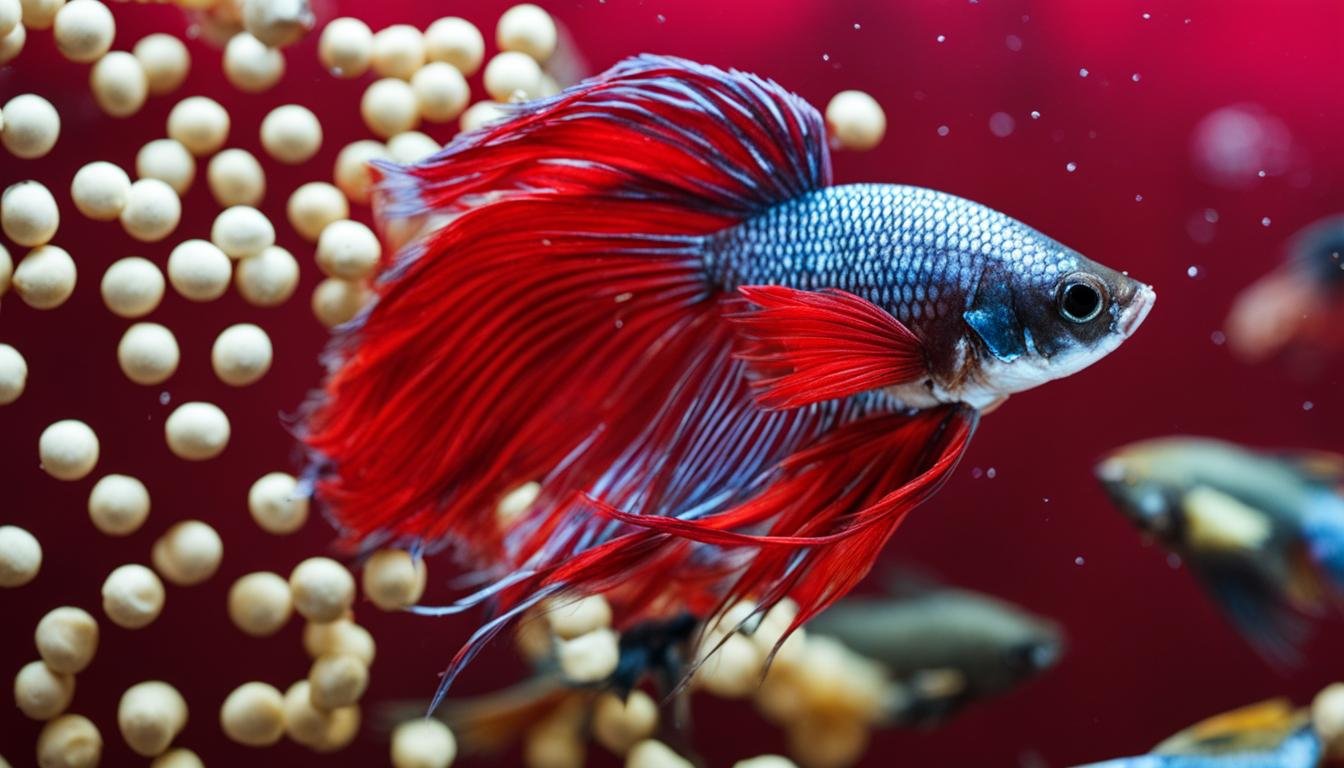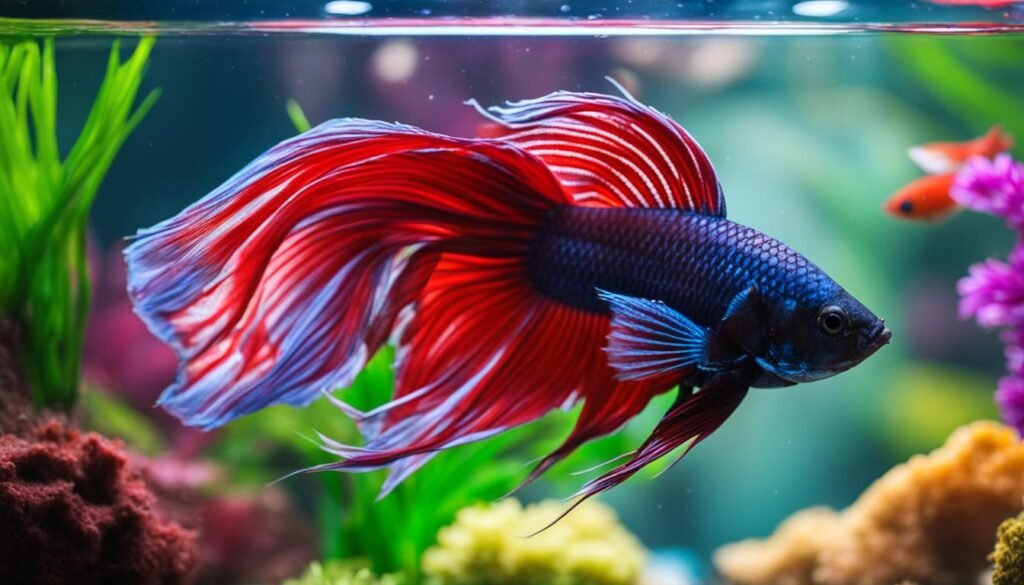Your cart is currently empty!

Can Betta Fish Eat Bread? Exploring Betta Diets & Nutrition
Welcome to our guide on betta fish diets and nutrition! Betta fish, also known as Siamese Fighting Fish, have specific dietary requirements to ensure their health and well-being. In this section, we will address the question: Can betta fish eat bread? We’ll delve into the intricacies of betta fish diets, explore suitable food options, and highlight the importance of nutrition for these beautiful aquatic creatures.
Key Takeaways:
- Betta fish primarily eat commercially available pellets, flakes, and dried food.
- In their natural habitat, bettas feed on worms, insects, and small crustaceans.
- Safe human food treats for bettas include cooked, unseasoned meat and soft fruits and vegetables in small amounts.
- A balanced diet is crucial for bettas, with proteins, fats, and carbohydrates in appropriate proportions.
- Commercial pellets formulated for betta fish are a great nutritional option.
Betta Fish Treats: Delicious and Nutritious Alternatives to Bread
When it comes to treating our beloved betta fish, it’s important to choose options that are not only delicious but also provide essential nutrients for their well-being. While bread may be a tempting choice, it is not recommended for bettas due to its indigestible complex carbs. Instead, let’s explore some suitable and healthy alternatives that will satisfy our fishy friends’ taste buds!
Protein-Rich Delights
One of the best treats for betta fish is protein-rich foods. Live or freeze-dried brine shrimp and bloodworms are excellent choices. These treats are packed with essential vitamins and minerals that contribute to the overall health of bettas. Not only will they be delighted by the taste, but these protein-rich treats also mimic their natural diet, promoting a balanced and nutritious feeding regimen.
Occasional Vegetables
While bettas are primarily carnivorous, it is beneficial to incorporate some vegetables into their diet as well. Occasionally offering treats like blanched zucchini and spinach can provide additional nutrients and add variety to their meals. Remember to keep the vegetable treats to a maximum of 25% of their total intake, ensuring a well-rounded diet for your betta.
Commercial Pellets: Convenient and Nutritious
In addition to live and freeze-dried treats, specially formulated commercial pellets designed for betta fish can also make a fantastic treat option. These pellets are packed with essential nutrients and come in a variety of flavors, providing a convenient and well-balanced meal for your betta. Be sure to choose high-quality pellets specifically tailored for bettas to ensure their nutritional needs are met.
By selecting suitable and nutritious treats for our betta fish, we can keep them happy and healthy. Remember, moderation is key when it comes to treats, so be mindful of the quantity and frequency of feeding. Treat your betta fish to delicious and nourishing options that will not only satisfy their cravings but also contribute to their overall well-being.
The Importance of a Balanced Diet for Bettas

When it comes to keeping betta fish healthy and thriving, a balanced diet is crucial. Providing the right nutrition ensures that your bettas have the energy, immunity, and overall well-being they need to live their best lives. Here, we will explore the importance of a balanced diet for bettas, including the role of protein-rich foods and the inclusion of vegetables in their diet.
The Role of Protein-Rich Foods
Protein is essential for bettas as it supports their growth, repair of body tissues, and the production of essential enzymes. Including protein-rich foods in their diet is crucial to meet their nutritional needs. Live foods such as brine shrimp, bloodworms, mosquito larvae, black worms, and daphnia are excellent sources of protein that bettas naturally consume in their habitat. These can be offered as occasional treats or incorporated into their regular feeding regimen with freeze-dried options. Aim to provide a varied mix of protein sources to ensure a well-rounded diet.
The Benefits of Vegetables
While protein is crucial, it’s also important to include vegetables in a betta’s diet. Vegetables offer vital vitamins, minerals, and fiber that contribute to overall health and digestion. Options like zucchini, spinach, and peas can be blanched and then finely chopped or mashed to be easily consumed by bettas. Remember to keep vegetable intake to a maximum of 25% of their total diet to avoid digestive issues. Including vegetables not only adds nutritional value but also helps mimic their natural diet and provides enrichment.
Variety for Optimal Health
A balanced diet for bettas involves offering a variety of foods to ensure they receive a mix of proteins, fats, and carbohydrates for optimal health. Alongside protein-rich foods and vegetables, it is recommended to incorporate high-quality commercial pellets specifically formulated for betta fish. These pellets are designed to provide essential nutrients and help meet their dietary requirements. By offering a diverse range of food options, you can mimic their natural diet and promote better overall health and vitality.
- Include protein-rich foods: Incorporate live or freeze-dried options like brine shrimp and bloodworms to meet your betta’s protein needs.
- Offer a variety of vegetables: Add blanched and finely chopped vegetables such as zucchini, spinach, and peas for essential vitamins and minerals.
- Include commercial pellets: Choose high-quality pellets formulated for betta fish to ensure they receive all the necessary nutrients.
- Provide a balanced mix: Aim to offer a varied diet that includes a mix of proteins, fats, and carbohydrates to support optimal health and vitality.
Alternatives to Bread for Betta Fish Treats
Bread is not a recommended treat for betta fish as it contains complex carbs that are indigestible for them. Instead, there are several alternatives that can be given as treats to bettas to provide them with necessary nutrients. Here are some protein-rich options to consider:
- Freeze-dried brine shrimp: Freeze-dried brine shrimp is a great alternative to bread as it contains essential vitamins and minerals that contribute to the overall health of bettas.
- Brine shrimp pellets and flakes: Brine shrimp pellets and flakes are convenient options to offer bettas as a protein-rich treat.
- Bloodworms: Live or freeze-dried bloodworms are another excellent source of protein for bettas.
- Mosquito larvae and daphnia: Occasionally offering live foods like mosquito larvae and daphnia can add variety to the betta’s diet.
It is important to provide these treats in moderation and ensure they do not exceed the betta’s dietary needs. Offering a balanced and varied diet is key to maintaining the health and well-being of your betta fish.
Conclusion
In summary, it is important to understand the dietary needs of betta fish to ensure their health and well-being. While bread may be a common human food, it is not suitable for bettas. Feeding them bread can lead to digestive issues and provide little nutritional value. Instead, we should focus on providing a balanced diet that mimics their natural food sources and includes commercially available fish foods.
To meet the nutritional requirements of betta fish, we should prioritize protein-rich treats such as brine shrimp and bloodworms. These options provide essential vitamins and minerals that contribute to their overall health. Additionally, offering occasional vegetables like spinach and peas can add variety to their diet. However, it is crucial to feed treats in moderation and not exceed their dietary needs.
By providing a varied diet that includes their natural food sources and commercial fish foods, we can ensure that our betta fish receive the necessary nutrients for optimal health. Remember, maintaining a balanced diet is key to keeping our bettas happy and healthy.
FAQ
Can betta fish eat bread?
No, bread is not recommended for betta fish as it can cause digestive problems and does not provide any nutritional benefits.
What treats can betta fish eat?
Betta fish can safely consume treats such as cooked, unseasoned meats like boiled chicken and small pieces of cooked, unseasoned shrimp. Soft fruits and vegetables like cooked peas, spinach, and lettuce can also be given in small amounts. Live or frozen brine shrimp, daphnia, and bloodworms can be nutritious additions to their diet.
Why is a balanced diet important for bettas?
A balanced diet is important for betta fish to ensure they receive all the necessary nutrients for optimal health. Their natural diet consists of a variety of live foods rich in proteins, such as brine shrimp and bloodworms, along with occasional vegetables. Commercial pellets formulated for betta fish are also a great option to provide the necessary nutrients.
What are some alternatives to bread for betta fish treats?
Instead of bread, betta fish can be given treats such as freeze-dried brine shrimp, bloodworms, and pellets specifically designed for betta fish. Live foods like mosquito larvae and daphnia can also be offered occasionally to add variety to their diet.
Leave a Reply